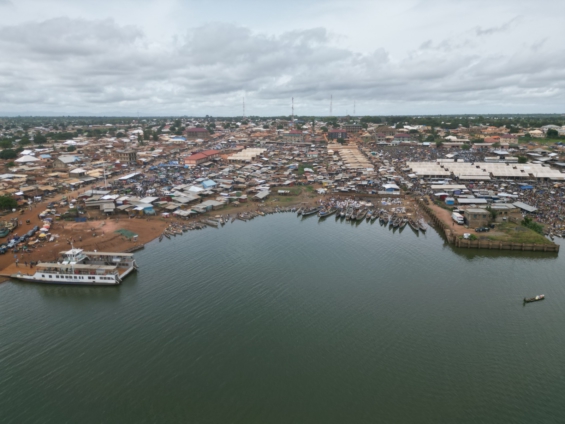The European Union (EU) has allocated €80,000 in humanitarian aid for flood preparedness in the northern part of Ghana. The funding is aimed at enhancing the area's ability to anticipate, mitigate, and respond to floods effectively.
It will be utilized for several purposes, including the establishment of early warning systems, updating risk assessments, and monitoring mechanisms. These measures are intended to trigger actions that can prevent or reduce the impact of floods, particularly in vulnerable areas along riverbanks, where floods could have severe consequences for agriculture and community resilience.
About 2,144,677 people in the Northern, Upper East, and Upper West regions are at risk of flooding, making this funding crucial for their protection.
The EU's objective is to mitigate the impact of floods on up to 50,000 people during the peak season by addressing their shelter, water, sanitation, and health vulnerabilities.
“It will enable the Ghanaian Red Cross to implement both anticipatory and early actions and will prop up preparedness actions such as training of volunteers, prepositioning of response stocks that should enable quicker deployment of response, early evacuation of people in identified sites, simulation exercises, awareness sessions for water-related diseases prior the floods seasons,” said a statement issued on September 7, 2023.
The funding will support the Ghanaian Red Cross in implementing both anticipatory and early response actions. This includes training volunteers, prepositioning response supplies for quicker deployment, early evacuation planning, simulation exercises, and awareness campaigns about water-related diseases ahead of the flood season.
Ghana has faced recurrent flooding due to heavy rains and the spillage of the Bagre Dam in Burkina Faso. The overflow of Ghana's river systems, caused by the spillage of the dam reaching its maximum level of 235 meters, has consistently impacted the northern part of the country, posing risks to lives and livelihoods.
The statement further indicated that funding is part of the EU's contribution to the Disaster Relief Emergency Fund (DREF) of the International Federation of Red Cross and Red Crescent Societies (IFRC).
The EU is committed to promoting disaster risk reduction and anticipatory actions, in line with the Sendai Framework for Disaster Risk Reduction (2015-2030).
Latest Stories
-
Video footage appears to contradict Israeli account of Gaza medic killings
30 minutes -
Goldbod won’t be a player and referee; there’s no conflict of interest – PMMC Boss assures
1 hour -
Kwakye Ofosu and Ntim Fordjour clash on social media over flight claims after Newsfile
2 hours -
Unilever Ghana launches affordable ‘Comfort’ sachet fabric conditioner
2 hours -
“Ghana is not just an anarchic state, it’s a vampire state”- Prof Aning on missing ECG containers
2 hours -
Goldbod must focus on how to ensure compliance – Dr Stephen Ackah
3 hours -
Sammy Gyamfi calls for urgent investigation into missing containers, commends Energy Minister for transparency
4 hours -
‘This is a clear organised crime’ – Victoria Bright on missing ECG containers
4 hours -
Presidency gagging relevant institutions from probing aircraft case suggests cover-up – Ntim Forjour claims
4 hours -
US tariffs pose significant risk to global economic outlook – IMF
4 hours -
Regional Collaboration and Standards – Policy recommendations for coordinated biofuel development in West and East Africa
4 hours -
US tariffs raise US recession risks, threaten global economic outlook – Fitch
4 hours -
TPTI holds 8th graduation, MCA graduates urged to pursue excellence
5 hours -
ECG containers not missing, officials must account for them – Kofi Bentil
5 hours -
Kwakye Ofosu’s response about suspicious flights not credible – Ntim Fordjour
5 hours

